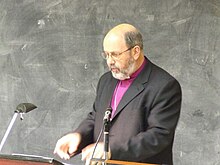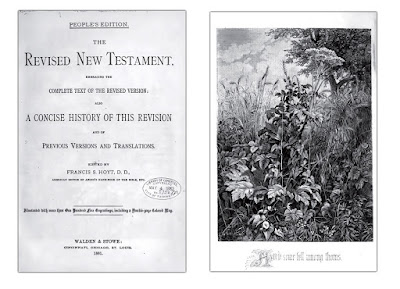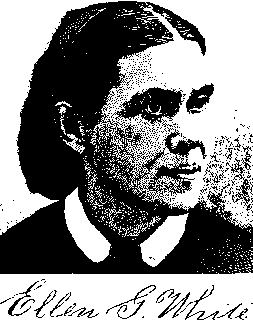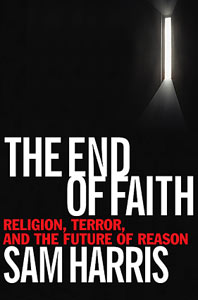Friday, December 1, 2023
Bible Scholar N.T. Wright on This Day in History
Saturday, November 18, 2023
Meatless Fridays on This Day in History
Sunday, July 16, 2023
Mary Baker Eddy and Ellen White on This Day in History
Thursday, June 22, 2023
Scholar Writes Paper Arguing for the "a god" Rendering at John 1:1c
Saturday, June 10, 2023
Kenneth Taylor and the "Living Bible" on This Day in History
Sunday, April 9, 2023
Atheist Sam Harris on This Day in History
Friday, March 31, 2023
Benjamin Hoadly and the Bangorian Controversy on This Day in History
Benjamin Hoadly
Sunday, March 26, 2023
Richard Dawkins on This Day in History
This day in history: Richard Dawkins was born on this day in 1941. Dawkins is a British author, biologist, evolutionist, leftist, agnostic and militant atheist. That last part may be confusing. In 2002 Richard Dawkins publicly argued for the position of militant atheism and claimed that he will not feel anything after death, however, in later years, when interviewed, he claimed that, on a scale of 1 to 7, where 1 is perfect faith in God and 7 is perfect confidence in atheism, he is a 6.9. Dawkins declared that he was an agnostic in 2006 and 2012. (In his book The God Delusion, Dawkins said that "permanent in agnosticism in principle" is "fence-sitting, intellectual cowardice.")
In a debate with Giles Fraser (former Canon Chancellor of St Paul's Cathedral) Dawkins said that most Christians weren't Christian because they couldn't tell you the first book of the New Testament. Giles asked Dawkins if he could recite the full title of Darwin's Origin of the Species, and Dawkins boasted that he could. When challenged, Dawkins dithered and said: "Oh God." (The full title of Charles Darwin's book is On the The Origin of Species by Means of Natural Selection, or the Preservation of Favoured Races in the Struggle for Life and evolutionists rarely cite the book's full title as it is racist.)
On February 14, 2012, an editorial in The Daily Telegraph claimed regarding the radio debate: "Dr. Fraser skewered the atheist campaigner Richard Dawkins so fabulously, so stylishly, and so thoroughly that anti-religion’s high priest was reduced to incoherent mumbling and spluttering."
Theodore Beale wrote concerning the embarrassing incident for Dawkins:
“As I have said repeatedly, Richard Dawkins is a huge intellectual fraud, and perhaps those who previously expressed incredulity at the idea that I would quite easily trounce the old charlatan in a debate will find it just a bit more credible now. This behavior isn't an outlier or a momentary lapse of memory, it is entirely characteristic. The man quite frequently pretends to knowledge that he patently does not possess and assumes he knows things that he obviously does not, which is why he avoids debate with those who are aware of his intellectual pretensions and are capable of exposing them.
It's bad enough that Dawkins couldn't come up with the name of what he considers to be the most important book ever written immediately after claiming he could do so, but in addition to stumbling a little on the subtitle, he even forgot the rather important part of the title that refers to the actual mechanism supposedly responsible!"
Friday, March 24, 2023
King James on This Day in History
See also The King James Version Bible Companion: 100 Books to Download, andRare Olde English Bibles to Download (Tyndale, Matthews, Coverdale, AV1611) and
Over 60 Different Editions of the King James Bible to Download
For a list of all of my digital books on disk click here
James VI of Scotland is proclaimed King James I of England and Ireland, upon the death of Elizabeth I on this day in 1603. James was dubbed the wisest fool in Christendom.
Even though James became the impetus in what came to called the King James Bible, he did not encourage a translation of the Bible in order to enlighten the common people: his sole intent was to deny them the marginal notes of the Geneva Bible. The marginal notes of the Geneva version were what made it so popular with the common people.
James had a superficial education, and barely knew what his courtiers were talking about when they referred to classical literature etc,, and he was politically less than savvy, and made some very silly decisions out of sentiment and personal prejudice. He was inclined to praise his own knowledge too, beyond the level which was justified, since although he was educated as regards the Scottish aristocracy, there were a lot of genuine scholars among the English upper class he met after becoming king of England in 1603, who outclassed him effortlessly. As an older man, also, he had the distressing habit of picking up and promoting pretty boys, (like Robert Carr the stone mason’s apprentice, and Buckingham, his ‘Steenie’ (St Stephen), not quietly, but in the sight of his Queen and court, hanging round their necks and stroking them, calling himself their Daddy, and being generally tactless about it.
"He was a flaming homosexual. His activities in that regard have been recorded in numerous books and public records; so much so, that there is no room for debate on the subject.
The very people who use the King James Bible today would be the first ones to throw such a deviant out of the congregations.
The depravity of King James I didn't end with sodomy. James enjoyed killing animals. He called it 'hunting.' Once he killed an animal, he would literally roll about in its blood. Some believe that he practiced bestiality while the animal lay dying.
James was a sadist as well as a sodomite: he enjoyed torturing people. While King of Scotland in 1591, he personally supervised the torture of poor wretches caught up in the witchcraft trials of Scotland. James would even suggest new tortures to the examiners. One 'witch,' Barbara Napier, was acquitted. That event so angered James that he wrote personally to the court on May 10, 1551, ordering a sentence of death, and had the jury called into custody. To make sure they understood their particular offense, the King himself presided at a new hearing — and was gracious enough to release them without punishment when they reversed their verdict.
History has it that James was also a great coward. On January 7, 1591, the king was in Edinburgh and emerged from the toll booth. A retinue followed that included the Duke of Lennox and Lord Hume. They fell into an argument with the laird of Logie and pulled their swords. James looked behind, saw the steel flashing, and fled into the nearest refuge which turned out to be a skinner's booth. There to his shame, he 'fouled his breeches in fear.'" Source
*For verification of King James homosexuality, I got my info from Global Insights. You can also find more info at Otto Scott's "James I: The Fool As King" (Ross House: 1976), pp. 108, 111, 120, 194, 200, 224, 311, 353, 382; King James-VI of Scotland/I of England by Antonia Fraser (Alfred A. Knopf, New York 1975)pp. 36, 37, 38; King James VI and I by David Harris Willson, pp.36, 99; James I by his Contemporaries by Robert Ashton, p114; and A History of England by Samuel Rawson Gardiner, Vol. 4, p.112. Check also A LITERARY HISTORY OF THE BIBLE by Geddes MacGregor who has devoted a whole chapter entitled "QUEEN" JAMES.
In the Beginning, by Alister McGrath, pp. 170-71
The Mammoth Book of Private Lives by Jon E. Lewis, pp. 62,65,66
James White also makes mention of it in his book, THE KING JAMES ONLY CONTROVERSY.
See also King James and the History of Homosexuality by Michael B. Young and King James and Letters of Homoerotic Desire by David Moore Bergeron, both available on amazon.com
For those people who feel that the above is a result of the attack on King James by the 17th century tobacco industry are ignorant of the fact that his behavior and personal life were quite well known to his contemporaries. "He disdained women and fawned unconscionably on his favorite men." ENCYCLOPEDIA AMERICANA-pp. 674,675
Thursday, February 23, 2023
Polycarp on this Day in History
Sunday, February 19, 2023
Emperor Constantius II on This Day in History
Monday, February 6, 2023
Jefferson, Priestley, and the Trinity
I wish you would reflect a little on the subject, and then inform us what there is in the doctrine of the Trinity, in itself considered, that can recommend it as a part of a system of religious truth. For there is neither any fact in nature, nor any one purpose of morals, which are the object and end of all religion, that requires it
If the doctrine of the Trinity be true, it is, no doubt, in the highest degree important and interesting. Since, therefore, the evangelists give no certain and distinct account of it, and say nothing of its importance, it may be safely inferred that it was unknown to them
Why was not the doctrine of the Trinity taught as explicitly, and in as definite a manner, in the New Testament at least, as the doctrine of the divine Unity is taught in both the Old and New Testaments, if it be a truth? And why is the doctrine of the Unity always delivered in so unguarded a manner, and without any exception made in favour of the Trinity, to prevent any mistake with respect to it, as is always now done in our orthodox catechisms, creeds, and discourses on the subject?
The doctrine of Transubstantiation implies a physical impossibility, whereas that of the Trinity, as unfolded in the Athanasian Creed, implies a mathematical one; and to this only we usually give the name of contradiction ......
Now I ask, Wherein does the Athanasian doctrine of the Trinity differ from a contradiction? It asserts, in effect, that nothing is wanting to either the Father, the Son, or the Spirit, to constitute each of them truly and properly God; each being equal in eternity and all divine perfections; and yet that these three are not three Gods, but only one God. They are, therefore, both one and many in the same respect, viz., in each being perfect God. This is certainly as much a contradiction as to say that Peter, James, and John, having each of them everything that is requisite to constitute a complete man, are yet, all together, not three men, but only one man. For the ideas annexed to the words God or man cannot make any difference in the nature of the two propositions .....
Why, then, should you be so desirous of retaining such a doctrine as this of the Trinity, which you must acknowledge has an uncouth appearance, has always confounded the best reason of mankind, and drives us to the undesirable doctrine of inexplicable mysteries? Try, then, whether you cannot hit upon some method or other of reconciling a few particular texts, not only with common sense, but also with the general and the obvious tenor of the Scriptures themselves. In the meantime, this doctrine of the Trinity wears so disagreeable an aspect, that I think every reasonable man must say, with the excellent Archbishop Tillotson, with respect to the Athanasian Creed, "I wish we were well rid of it." This is not setting up reason against the Scriptures, but reconciling reason with the Scriptures, and the Scriptures with themselves .....
I therefore think it of the greatest consequence to Christianity, that this doctrine of the Trinity, which I consider as one of its most radical corruptions, should be renounced in the most open and unequivocal manner by all those whose minds are so far enlightened as to be convinced that it is a corruption and an innovation in the Christian doctrine, the reverse of what it was in its primitive purity; and that they should exert themselves to enlighten the minds of others."
Friday, January 20, 2023
Myles Coverdale on This Day in History
This Kindle book is now available on Amazon by clicking here...and it is only 99 cents











.jpg/225px-Living_Bible_(cropped).jpg)












